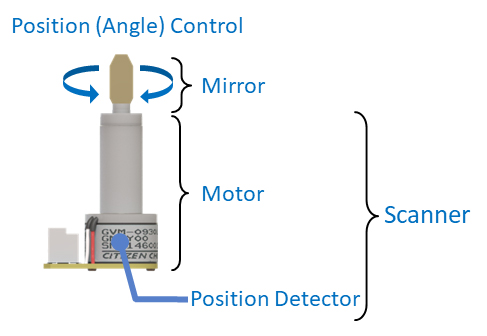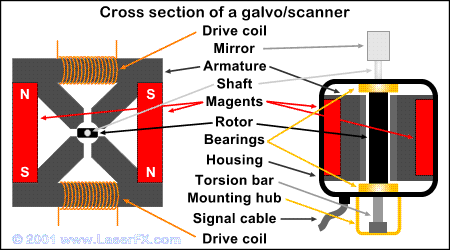Fixing Typical Problems with Your Galvanometer Scanner: Advice
How a Galvanometer Scanner Improves Performance in Laser Scanning Technologies
The combination of galvanometer scanners in laser scanning technologies stands for a pivotal development in precision design. By assisting in rapid and exact changes of laser beam of light direction, these devices substantially improve operational performance across numerous applications, from clinical imaging to commercial inscription.
Comprehending Galvanometer Scanners
A galvanometer scanner is a sophisticated tool that leverages electromagnetic concepts to achieve exact angular motion of mirrors or various other reflective surfaces. These scanners run via the interaction of an electric existing and an electromagnetic field, enabling quick and exact positioning. This innovation is vital in applications calling for high-speed scanning, such as laser engraving, optical communication, and medical imaging.

Galvanometer scanners are usually defined by their fast feedback times and high angular resolution, making them suitable for applications that demand fast activities and precise placing. Their dependability and efficiency make them an important part in contemporary laser scanning modern technologies, contributing significantly to developments in different fields, consisting of manufacturing, health care, and telecoms.
System of Laser Light Beam Control

The control mechanism relies upon closed-loop feedback systems that constantly keep track of the beam of light's placement. The signals from optical sensing units give real-time data to the control system, enabling quick changes to preserve accuracy. This is important in applications where also minor discrepancies can endanger the top quality of the check or engraving.
In addition, the galvanometer's response time is paramount; high-speed motors allow speedy activities, making certain that the laser light beam can quickly trace complex patterns or do detailed operations. The integration of electronic signal processing further boosts the responsiveness and accuracy of the galvanometer scanner. On the whole, the mechanism of laser beam control via galvanometer scanners exemplifies the blend of advanced engineering and innovation, yielding high-performance end results in laser scanning applications.
Advantages of Enhanced Precision
Enhanced accuracy in laser scanning modern technologies supplies substantial advantages across numerous applications, from industrial manufacturing to medical procedures. The combination of galvanometer scanners enables highly precise beam of light positioning, which is crucial for jobs needing thorough detail. This improved precision guarantees that the laser can target particular areas with marginal deviation, leading to superior high quality results.
In commercial contexts, precise laser scanning causes improved item uniformity and reduced product waste. Parts manufactured with high precision are much less likely to require rework, therefore improving efficiency and minimizing functional expenses. Likewise, in clinical applications, the accuracy of laser procedures can significantly affect patient results. In laser surgery, see this page specific targeting minimizes damage to surrounding cells, leading to quicker healing times and fewer issues.
Moreover, enhanced precision facilitates innovative applications such as 3D imaging and microfabrication, where also minute mistakes can result in significant errors. By offering reliable and repeatable laser positioning, galvanometer scanners add to the total performance and performance of laser systems. In summary, the advantages of boosted precision not just boost functional efficiency however additionally boost the standards of top quality and safety in numerous markets.
Applications in Different Industries
The versatility of galvanometer scanners in laser scanning technologies see this site extends throughout multiple markets, each gaining from the accuracy they offer. In the clinical field, these scanners are critical in applications such as laser surgery and imaging, allowing for extremely exact targeting of tissues while lessening damage to surrounding locations - galvanometer scanner. Their fast reaction and fine resolution are important in producing top quality outcomes
In the manufacturing sector, galvanometer scanners improve procedures like laser engraving and cutting. Their ability to swiftly direct laser beam of lights onto surfaces makes it possible for effective production lines, enhancing speed and accuracy in producing elaborate designs or components.
The auto market likewise capitalizes on galvanometer innovation for high quality control and examinations (galvanometer scanner). By employing high-speed scanning, suppliers can discover defects in settings up or products, ensuring that products satisfy stringent criteria
Moreover, in the enjoyment market, galvanometer scanners are utilized in laser light shows and display screens, offering dynamic visual experiences with precise control over laser activities.
Future Fads in Laser Scanning
Arising modern technologies are positioned to revolutionize the landscape of laser scanning, with galvanometer scanners at the leading edge of this transformation. As markets progressively demand precision and efficiency, the advancement of galvanometer modern technology will certainly drive significant improvements in laser scanning applications.
Future patterns show an expanding assimilation of expert system and artificial intelligence formulas, which will boost anchor information processing capabilities and automate decision-making in real-time. This synergy will enable extra sophisticated analysis of checked data, resulting in improved accuracy in applications such as 3D modeling and self-governing navigating.
In addition, the miniaturization of elements and the development of sophisticated materials will add to lighter, much more portable laser scanning systems. This transportability will expand the reach of laser scanning modern technologies into formerly hard to reach environments, such as remote terrain and complex building spaces.
The rise of enhanced reality (AR) and digital fact (VIRTUAL REALITY) applications will additionally shape the future of laser scanning. By combining galvanometer scanners with AR and VR, customers will certainly gain from immersive experiences that boost visualization and job preparation.
Conclusion
Finally, galvanometer scanners play a crucial duty in maximizing laser scanning modern technologies through their precise control of beam instructions and quick angular adjustments. The combination of innovative comments systems and optical sensors substantially improves operational rate and accuracy, leading to boosted results in applications such as laser engraving and clinical imaging. As industries progressively adopt these technologies, the continuous advancements in galvanometer scanner styles are expected to further raise efficiency criteria and expand application opportunities.
The integration of galvanometer scanners in laser scanning innovations represents a critical development in precision design. Generally, the system of laser light beam control with galvanometer scanners exemplifies the fusion of innovative design and modern technology, generating high-performance outcomes in laser scanning applications.
By supplying dependable and repeatable laser positioning, galvanometer scanners contribute to the overall performance and efficiency of laser systems.The adaptability of galvanometer scanners in laser scanning innovations expands across multiple industries, each profiting from the accuracy they supply.In conclusion, galvanometer scanners play a pivotal role in maximizing laser scanning innovations via their precise control of beam of light instructions and rapid angular modifications.